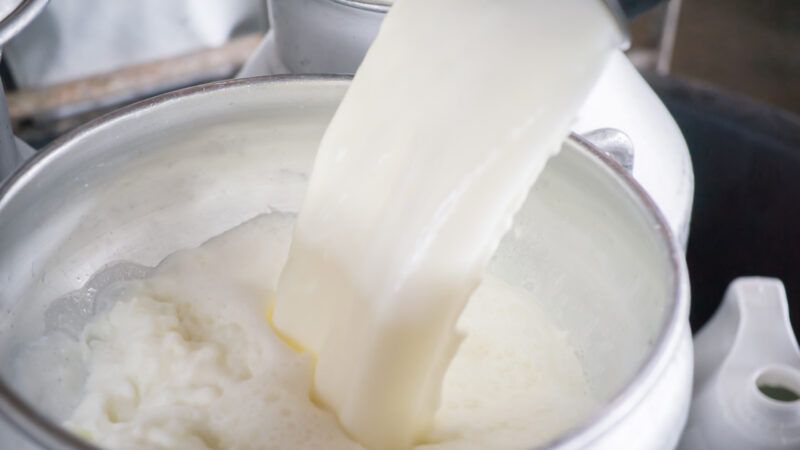Is America Finally Having Its Raw Milk Moment?
Trump’s RFK Jr. nomination and another rumored cabinet ally may give raw milk legalization its biggest boost yet.

American media is abuzz with news of President-elect Donald Trump's nomination of Robert F. Kennedy Jr. to be the head of the Department of Health and Human Services (HHS). Seemingly every story mentions his controversial views on topics from vaccines to fluoride in the water to raw milk—a longtime libertarian cause célèbre. Though it's hard to envision a more unlikely catalyst, RFK Jr.'s nomination may be the final push that gets raw milk across the legalization finish line.
Until the late 1800s, raw milk was simply known as "milk" and was the only game in town for Americans desiring a delicious dairy beverage. But when it was discovered that heating up products like milk could reduce the presence of potentially harmful bacteria, the pasteurization craze was underway. Given reports of thousands of babies dying from bacteria-riddled milk around this time period, pasteurization was seen as a remarkable public health breakthrough.
This set off a wave of 20th century state and local government mandates that required milk to be pasteurized. Finally, in 1987, a federal court cemented a federal ban on all interstate raw milk sales. But not long afterward, the modern organic food movement was born, and raw milk became a cult favorite among the crunchy political left. Now, raw milk has increasingly been adopted as a sort of culture war status symbol on the political right.
"Long a fringe health food for new-age hippies and fad-chasing liberal foodies, raw milk has won over the hearts and minds of GOP legislators and regulators in the last few years," writes Marc Novicoff in Politico. In addition to its inherent deregulatory appeal, Novicoff recounts that "conservatives discovered that raw milk fit neatly inside a worldview that was increasingly skeptical of credentialed expertise."
Over the last decade, numerous states have passed laws to legalize raw milk, leading food policy expert Baylen Linnekin to declare that the "raw milk restoration is underway." Could it now be about to kick into overdrive, potentially even spreading to an overturn of the federal interstate sales ban?
Whatever one's views of RFK's potential adeptness—or lack thereof—at navigating the federal bureaucracy to pursue his agenda, he may not be the only member of Trump's cabinet to be a raw milk enthusiast. Rep. Thomas Massie (R–Ky.), who has run a bill in Congress for the last decade to overturn the federal ban, is heavily rumored to be the next Secretary of Agriculture.
To further contribute to the momentum, there is at least some evidence that the political left may embrace raw milk again as well. Although most states that have passed recent raw milk reforms skew red, states like Colorado have seen Democratic lawmakers introduce raw milk bills this past year (with Governor Jared Polis supporting the effort). Additionally, deep-blue Delaware just became the latest state to legalize raw milk. According to the Farm-to-Consumer Legal Defense Fund, a majority of states have now legalized raw milk in some form and only a handful still ban it outright.
At the federal level, in addition to raw milk's ideological virtue-signaling appeal to GOP lawmakers and administration officials, Senators like Cory Booker (D–N.J.) have taken strong anticorporate agriculture stances during their time in office, thereby making it at least conceivable they could join Republican colleagues in overturning the federal ban.
The pushback, however, is still significant. Numerous studies and health experts warn of the dangers of raw milk compared to pasteurized milk. Data from the Centers for Disease Control found that between 1998 and 2018, there were 202 outbreaks of foodborne illnesses from raw milk, which led to 2,645 people becoming ill, 228 hospitalizations, and three deaths.
While few would seriously dispute that pasteurized milk reduces the chance of acquiring a food-borne illness, it raises an interesting question: What should the comparison point be for raw milk in terms of safety? Should it be compared to pasteurized milk, or is it fairer to compare it to other raw (or even non-raw) foods?
For instance, raw oysters—a delicacy enjoyed by many Americans that are not legally prohibited—kill around 100 people per year, compared to the 3 raw milk deaths the CDC found over two decades. A 2024 salmonella outbreak linked to backyard poultry—another legal activity in most jurisdictions—resulted in 125 hospitalizations and one death in less than a year. In the 12-year period from 1998 to 2010, the CDC recorded 1,345 illnesses, 104 hospitalizations, and 19 deaths from deli meat, while even the humble fruit salad caused 1,323 illnesses, 29 hospitalizations, and 1 death during this period.
In other words, raw milk doesn't appear to be uniquely dangerous compared to other completely legal and freely available foods but is still prohibited in a handful of states and subject to a federal ban. As improbable as it may seem, RFK's nomination—with a potential Rep. Massie add-on nomination—could be what finally breaks open the raw milk legal dam.


Show Comments (132)